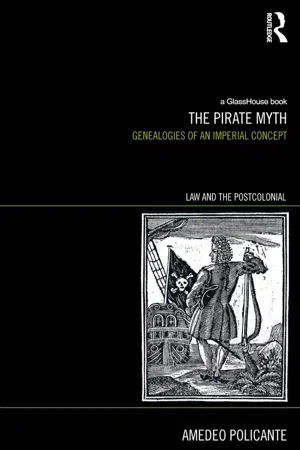
- 244 pages
- English
- ePUB (mobile friendly)
- Available on iOS & Android
About This Book
The image of the pirate is at once spectral and ubiquitous. It haunts the imagination of international legal scholars, diplomats and statesmen involved in the war on terror. It returns in the headlines of international newspapers as an untimely 'security threat'. It materializes on the most provincial cinematic screen and the most acclaimed works of fiction. It casts its shadow over the liquid spatiality of the Net, where cyber-activists, file-sharers and a large part of the global youth are condemned as pirates, often embracing that definition with pride rather than resentment. Today, the pirate remains a powerful political icon, embodying at once the persistent nightmare of an anomic wilderness at the fringe of civilization, and the fantasy of a possible anarchic freedom beyond the rigid norms of the state and of the market. And yet, what are the origins of this persistent 'pirate myth' in the Western political imagination? Can we trace the historical trajectory that has charged this ambiguous figure with the emotional, political and imaginary tensions that continue to characterize it? What can we learn from the history of piracy and the ways in which it intertwines with the history of imperialism and international trade? Drawing on international law, political theory, and popular literature, The Pirate Myth offers an authoritative genealogy of this immortal political and cultural icon, showing that the history of piracy – the different ways in which pirates have been used, outlawed and suppressed by the major global powers, but also fantasized, imagined and romanticised by popular culture – can shed unexpected light on the different forms of violence that remain at the basis of our contemporary global order.
Frequently asked questions
The Pirate Myth

Contents
- Acknowledgments
- Note
- Introduction
- PART I Pirate figures (1400–1800)
- 1. Persecutio piratarum: Pirate outlaws and the Roman Empire
- A Mediterranean imperium
- The pirate as hostis communis omnium
- Persecutio piratarum and the forms of Imperial peace
- 2. The Christian Commonwealth: Pirates, heretics and inquisitors
- Imperium Christianus: Spanish Universalism and the conquest of America
- Christianitas afflicta: The Atlantic wars of religion
- Corsarios luteranos: Pirates and heresy
- 3. Zones of plunder: Piracy and primitive accumulation
- Beyond the line: Imperialism and the state of exception
- Plunder as primitive accumulation
- ‘Corsairs-capitalists’ and outlaw buccaneers
- 4. Enemies of all nations: Piracy and the world-market
- Freedoms of the sea: From global plunder to the world-market
- Making the world safe for property: The pirate as hostis communis omnium
- The golden age of piracy
- Intermezzo: The romance of piracy
- 1. Persecutio piratarum: Pirate outlaws and the Roman Empire
- PART II Pirate spectres (1800–2012)
- 5. The empire of free trade: Liberal Universalism and the pirate states
- World-market and global shipping: British imperium in the n...
- 5. The empire of free trade: Liberal Universalism and the pirate states
Table of contents
- Cover Page
- Half Title Page
- Frontmatter 1
- Title Page
- Copyright Page
- Table of Contents
- Acknowledgments
- Note
- Introduction
- PART I Pirate figures (1400–1800)
- PART II Pirate spectres (1800–2012)
- Conclusion
- Bibliography
- Index